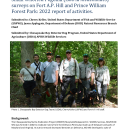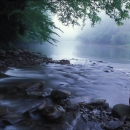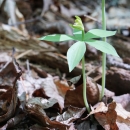The National Detector Dog Training Center trains dogs for various agencies including U.S. Customs and Border Protection and the U.S. Fish and Wildlife Service on targets ranging from agricultural products to contraband wildlife items. Detector dogs are those trained to find a target odor. Dogs have 300 million olfactory receptors making them efficient at searching landscapes to find an odor target as opposed to people visually surveying. In addition, they also tend to cover more ground than the handlers, effectively multiplying an already impressive search area.
The U.S. Fish and Wildlife Services contacted USDA-APHIS, Wildlife Services to help determine the feasibility of using detector dogs to survey for the threatened small whorled pogonia. In the summer of 2022 small whorled pogonia surveys using the detector dogs were conducted at Fort A.P. Hill in Caroline County VA and Price William Forest Park in Triangle, VA. Results are included in Small Whorled Pogonia (Isotria medeoloides) surveys on Fort A.P. Hill and Prince William Forest Park: 2022 report of activities.





